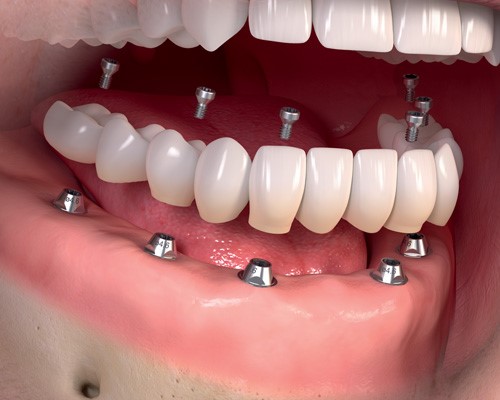
The installation of a dental prosthesis is far from being a harmless act since it is very concretely a question of replacing one or more missing teeth. The problem is that patients are still very poorly informed about existing solutions, different types of dentures and their pros and cons. Also, like a lot of dental care, prostheses represent a certain cost, which not everyone is ready to pay to regain a beautiful smile. And yet, beyond the only aesthetic aspect, the fitting of a dental prosthesis will allow you also to find chewing comfort, often essential in your daily life.
If you wear a prosthesis or if you plan to have one, this very comprehensive guide will allow you to sort through the different alternatives available to you to better understand the one that could better fit your clinical case. We will also help you find your way around the prices charged in France, and the reimbursement solutions you can claim. Finally, we will guide you through the different stages of fitting a dental prosthesis,
Why may you need a denture?
The main reason that may lead you to wish to have a dental prosthesis remains to replace one or more missing or too damaged teeth. Of course, the elderly are more likely to feel the need to replace all or part of their dentition, but the youngest can also turn to this solution as a result of cavities or periodontitis. By replacing your fallen or damaged teeth, a dental prosthesis will allow you to regain normal chewing, a pretty smile, but will also have a preventive role by preventing other teeth from moving.
How to choose your prosthesis
As we will see later, there are two main types of dentures. Fixed prostheses, and removable prostheses (themselves divided into partially or removable prostheses). It is very important that you know them and knows how to differentiate between these different alternatives to judge the one that will best meet your needs. Also, the budget between a removable prosthesis and a fixed dental prosthesis not being the same, this data will allow you to sort between your different requirements, whether financial, practical or aesthetic. Remember to discuss it well with your dentist and be transparent on the subject. Be careful because some specialists will turn to the most expensive solution. Or conversely, you will offer a low-end prosthesis, which will have a much shorter lifespan and may require many repairs, resulting in additional costs that you certainly had not anticipated.
- In general, fixed prostheses should turn to the implants since the crowns will generally be less robust and aesthetic. Whichever you choose, opt for ceramic-ceramic prostheses over ceramic and metal alloys.
- For removable prostheses, the best available option remains the total prosthesis on the implant (or total edition), then the stellite with attachment (partial edition) which will have a much better visual rendering and a longer lifespan than the stellite with the hook.
The different types of fixed prostheses
Let’s start the presentation of the different types of dentures with fixed solutions. As you can imagine, these are prostheses fixed in your mouth and which, once a dental surgeon has placed them, can no longer be removed. It is generally a preferred solution if you still have teeth. Here are the different forms of fixed dentures available to you.




